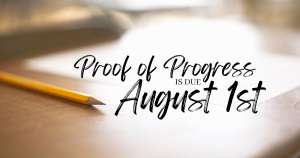What is Progress and How Do I Prove it?
Homeschooling is an increasingly popular educational option in Virginia. According to data from the Virginia Department of Education, the number of homeschoolers in the state has been steadily increasing over the past decade, with over 42,000 students being homeschooled in the 2020-2021 academic year.
One of the benefits of homeschooling is the flexibility it provides for tailoring the educational experience to meet the needs of individual students, and providing proof of progress is no different. Homeschoolers in Virginia are required to submit a notice of intent (NOI) to homeschool to their local school division by August 15 each year and to provide evidence of progress by August 1.

There are several ways that homeschoolers in Virginia can demonstrate proof of progress, including multiple standardized tests which meet Virginia state law requirements or multiple avenues of evaluation by a certified teacher.
Providing end of the year proof of progress can bring anxiety for even the most seasoned homeschooler, but for those just starting out, it can be a baffling and scary place to be. First things first, all your hard work this year will set your children up for success, and your calm confidence will be a comfort to them.
 One option is to purchase and administer a standardized test yourself. While administering a standardized test may sound overwhelming, know that these are generally easy to administer and most sites offer support personnel for when issues arise. Please be sure to read the instructions when ordering your test, as some require you to order the grade your student has completed, while others you order the grade for which you student will be entering. We realize some children will finish these tests faster than our summaries reflect below, but our time estimates encompass learning differences and beginning readers. The following tests can be administered by parents:
One option is to purchase and administer a standardized test yourself. While administering a standardized test may sound overwhelming, know that these are generally easy to administer and most sites offer support personnel for when issues arise. Please be sure to read the instructions when ordering your test, as some require you to order the grade your student has completed, while others you order the grade for which you student will be entering. We realize some children will finish these tests faster than our summaries reflect below, but our time estimates encompass learning differences and beginning readers. The following tests can be administered by parents:
- CAT and its newest edition, now called the Terra Nova: Both online and paper options are available. Plan for about 6 hours divided into 2-3 days of testing for the complete battery, 3 hours per day. Shorter surveys could take 1-2 days at about 3 hours per day. Plan for plenty of breaks. Timed and untimed options are available, allowing for flexibility of timing. The CAT6/Terra Nova, a quality test, and the CAT with newest copyright date are both available through Seton. The older copyright dated CAT is available through Academic Excellence. Approximate cost $30
- IOWA: (BJU online and elsewhere) Plan for about 6 hours for complete battery, over two days. You must complete it within two days. Plan for plenty of breaks. (IOWA online provides the proctor, and parents must be present. Alternate paper versions may require parent qualifications such as college diploma, you will need to check with test supplier to determine if an untimed version is available) Approximately $35
https://www.bjupresshomeschool.com/category/homeschool-iowa-tests
- Stanford: Plan for 6 hours over 2 or 3 days, at three hours per day. Plan for breaks. *The Stanford 10 is untimed.* No degree required. Seton is the Test Administrator. Approximately $40
The following tests must be administered by an evaluator. Evaluators must be Certified Teachers or possess and Masters level or higher degree in an academic field:
- Woodcock Johnson: Woodcock Johnson IV is the newest edition. Gives very accurate and detailed information about the students’ mastery, but also their aptitude in pinpoint specific categories. Can disclose specific areas of struggle. Legally, six to nine academic portions are required for proof of progress. There are several additional portions, but those are usually only used for diagnostic purposes. This gives your evaluator flexibility in choosing which portions to administer. Plan on two hours with your evaluator. Additional diagnostics may take more time. Can be useful for students with anxiety, because of its brevity. Used widely as the gold standard test to determine learning disabilities as well as giftedness. Approximately $150+
- Wide Range Achievement Test (WRAT5): Although this test can be completely administered in 30-45 minutes, it is extremely accurate and qualifies as a proof of progress test for those homeschooling under the Virginia legal statutes. Since the test is so short, it works especially well for children with ADD, anxiety and lower test endurance. The newer WRAT5, published by Pearson Clinical, uses newer norms, tougher vocabulary testing, and more Algebra for upper grades than previous editions. The WRAT can be described as a distillation of the Woodcock Johnson, using a single question to determine mastery, rather than several questions. Approximate cost is $150
- AAB: Plan on 2 hours for basic academic testing. This test is wonderful for students who have difficulty with reading because we can also administer subtests for listening and oral expression. (Students who have a difficult time reading are often excellent listeners – contrary to what their parents may think about their listening skills!) Be aware that the math computation subtest is timed. Approximate cost: $110-$140
- Portfolio evaluation for Virginia families: After speaking to your homeschool friendly evaluator, collect your samples of your child’s work (as specified by the evaluator). He or she will review your collection and will be able to advocate for your child’s progress during the year. The child does not have to speak to the evaluator. Usually, you will submit samples from the beginning, middle and end of the year for meaningful comparison. (Family members should not plan to act as the evaluator in this instance) Approximate cost: possibly free if a family friend who holds a master’s degree or teaching certificate is willing to volunteer- $150
- In person evaluation for Virginia families: a conversation with your homeschool friendly evaluator, during which he or she can interact with your child, ask questions, and talk about the child’s interests and aptitudes. This experience would be unique to each evaluator, contact potential evaluators to find out what they require. Approximately $100-$130
This blog post has been a joint effort between The Organization of Virginia Homeschoolers & Sarah Olbris of TheTestingLady.com
Sarah Olbris and her husband Dwayne homeschooled their four children for 18 years. Sarah graduated from Wingate College and NC State University. She has had experience teaching in the public schools in both junior high and high school, and holds a current teaching certificate. She has worked with gifted, average and special-needs children. Sarah has been testing homeschoolers since the late 1980’s and has been doing evaluations and portfolio assessments since the mid-to late ‘90’s.
Her extensive experience in testing hundreds of homeschoolers has led her to be a sought after speaker for homeschool groups and seminars. She has often been consulted as a statewide subject matter expert on testing for homeschoolers.
In her spare time (smile), Sarah enjoys reading fictional literature, cross stitching, and completing logic puzzles. She also teaches higher level math courses (Pre-Algebra through Pre-Calculus) to homeschooled students. She hopes that her years of experience will be beneficial and encouraging for you.

Thank you for this information, as this is the first year I am homeschooling my children. But I love the flexibility. Especially with a newborn in the family I can even homeschool on the go. As well as the ability to teach based off of a Christian standpoint due to my families belief system.